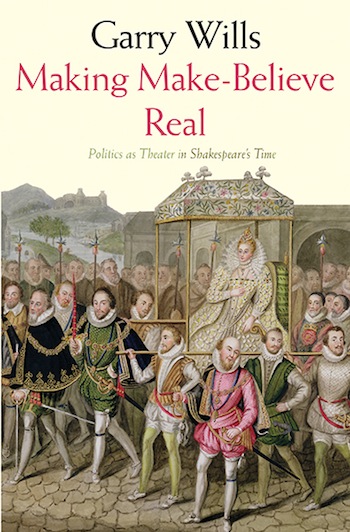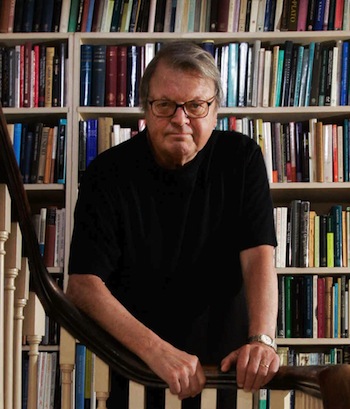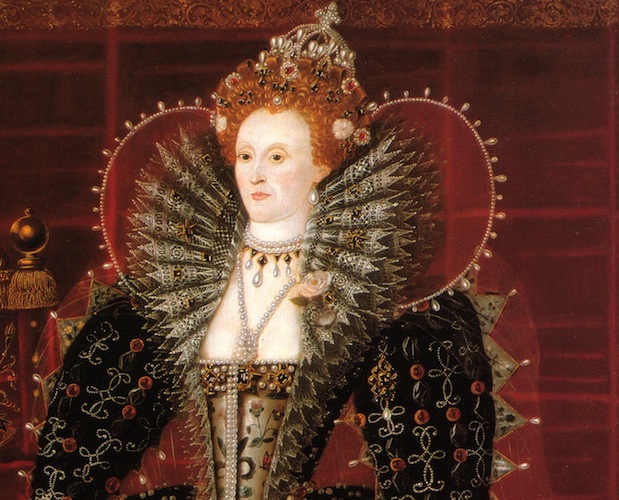Book Review: Drama Queen — The Theatrical Nature of Elizabethan England
To his credit, Garry Wills does not attempt to tell us what Shakespeare or his contemporaries “really meant,” nor does he suggest that there are ways that these plays ought be staged.
Making Make-Believe Real: Politics as Theater in Shakespeare’s Time by Garry Wills. Yale University Press, 424 pages, $30.
By Ian Thal

For the past few decades a group of scholars under the banner of New Historicism have dominated the interpretation of Shakespeare’s texts. (This approach to the Bard is most closely identified with Harvard’s Stephen Greenblatt.) The New Historicists are members of a generation of literary theorists who had been students in the 1960s and rose to intellectual prominence in the 1980s. They had come away from the 1960s disillusioned: on the international front by the Cold War and Vietnam; on the domestic front by Watergate and later by the conservative backlashes of the Reagan and Thatcher eras. The New Historicists tend to read literary texts in light of colonial struggle, class exploitation, gender politics, and race.
Historian Garry Wills takes aim at this line of thought in his latest book, Making Make-Believe Real: Politics as Theater in Shakespeare’s Time. He admits that Greenblatt’s methods have led to a better appreciation of how Shakespeare reworked the cultural artifacts of his era, and that this has provided valuable insights into Shakespearian texts both in the classroom and on stage. Still, as a historian, Wills is as interested in exploring the past as an alien country as he is in finding contemporary parallels. Noting that few of the political conceptions we moderns take for granted would have been understood by Shakespeare and his contemporaries, he faults the New Historicists (few of whom are actual historians) for projecting their own contemporary values (many of which, Wills, as a liberal and self-identified pacifist, shares) into the Bard’s work.
Wills, like many contemporary historians, enlists concepts from the social sciences in order to read the past properly, examining texts in light of the social, political, and economic structures of the time period. He relies particularly heavily on anthropology to analyze how the Elizabethans and Jacobeans understood their world. His thesis is that, much as the ancien-régime of Catholic Europe rooted its legitimacy in medieval cosmology, and Enlightenment regimes would later base their claims to authority on a rationalist understanding of human nature (a “mechanics of power”), Elizabeth’s regime asserted control through a dramaturgy of governance or, adopting a term from anthropologist Clifford Geertz, a “poetics of power.” The politics of Elizabeth’s court appropriated and then deftly transformed images and tropes from scripture, classical mythology, Arthurian romance, religious ceremony, and public pageantry. The symbolic performance of power wasn’t simply a representation of Elizabeth’s regime but her government’s bedrock reality — theatricality was truth. The fortunes of her court’s notables would be determined on how deftly they played their roles.

Author Garry Wills
At the outset of Elizabeth’s 44-year reign on the throne, England had been through a period of strife. The state’s official religion had shifted between Roman Catholicism and the Church of England multiple times, one king had died at the age of 15, another king had ruled from Spain, and rival factions, owing fealty to two different churches, backed rival warrior-queens for the English throne. Wills’ argument is that the stability of Elizabeth’s reign depended on its theatricality, and that, unsurprisingly, this stage crafted regime inspired the cultural/artistic flourishing of the era (much of which was generated by members of the court itself, such as Edmund Spencer, or Philip Sydney). This creativity eventually inspired further innovations in the courtly dramaturgy that would be inherited by the Scottish King James when he claimed the English crown after Elizabeth’s death.
Wills takes great issue with the New Historicists when he argues at length that their generally anti-militaristic, and anti-authoritarian, views have deeply distorted their understanding of Shakespeare’s monarchs. It was not just that when Elizabeth inspected her troops in 1588 on the eve of an anticipated Spanish invasion at Tilbury she used the occasion to make a rousing speech that rivals the rhetoric of Shakespeare’s Henry V. She was only a month short of her fifty-fifth birthday yet remained an accomplished enough equestrian to project an image of strength — she rode to Tilbury on a horse while dressed in battle armor:
My loving people, we have been persuaded by some that are careful of our safety, to take heed how we commit ourself to armed multitudes for fear of treachery; but I assure you, I do not desire to live to distrust my faithful and loving people[…] I know I have the body but of a weak and feeble woman, but I have the heart and stomach of a king, and of a King of England too, and think foul scorn that Parma or Spain, or any Prince of Europe should dare to invade the borders of my realm.
In that era, the concept of a warrior-monarch was not a compound noun — it was a redundancy. The notion of separation has led many New Historicists to interpret Shakespeare’s Henry V (mistakenly) as an example of anti-colonialist discourse. It has become popular to read (as well as stage) the play’s casus belli for Henry’s invasion of France as a trumped-up excuse for warfare, the text’s esoteric and cynical and esoteric legal wranglings seen as nothing but cynical justifications for an imperialist war. However, as Wills points out, Henry’s claim hinged on inheritance law — France was legally Henry’s realm and his French cousins were usurpers — so his war was not colonialist. The argument may seem obscure to us, but the terms of Henry’s argument would have been well understood by the Elizabethan public — any time a foreign monarch sued for the Queen’s hand there was the danger that a marriage would place England under foreign, and potentially Catholic, rule. A cynical interpretation of what inspired the conflict with France in Henry V can inspire a great evening of theater. But such anti-war readings must not be understood as representing the way the play would likely have been construed by its original audiences.
Likewise, Wills faults the New Historicists for their facile interpretation of religion, which causes them to gloss over the complex tensions between Protestant and Catholic (as well as Elizabeth’s moderate Church of England’s subtler conflict with the Puritans). Wills, though himself a committed Catholic, presents a nuanced look at the rise of Protestantism, exploring how it altered the “poetics of power,” noting that the shift to Protestantism led to increased literacy as well as to the greater centrality of the Bible in Christian belief. Books that had been given little emphasis in the Catholic tradition were no longer marginal – for example, Revelations began to be viewed as a prophetic allegory for contemporary events. Likewise, the figure of Deborah in Judges could be seen as presaging the rule of Queen Elizabeth, a woman who held political and military power.
At the same time, Wills paints a deeply ambiguous portrait of Shakespeare’s religious adherence. Frequent public controversies involving Catholic and Protestant apologists had generated a theologically literate audience that was familiar with the rituals and arguments on both sides. Yes, Shakespeare famously makes use of the Catholic notion of Purgatory in Hamlet, but he also gives us the Porter in Macbeth mocking the cult of Catholic martyrdom. We will never know definitively if the playwright himself was syncretic or not. But his city was.
On the one hand, Elizabeth distanced herself from Catholic rituals that would make her look as if she was subservient to religious authority – she and her supporters insisted that her legitimacy came solely through her bloodlines. Yet one Catholic ritual that she maintained (though re-contextualized) was that of washing the feet of the poor (much as the current Pope Francis does) during her annual processions through her realm. These journeys were expensive annual undertakings, but they allowed her to keep in close contact with the most remote locales of her realm. They also fostered theater as politics – entertainment stops on these processions often included several days of oratory, poetry, plays, music performances, and atheletic competitions. These sophisticated showbiz events no doubt inspired the images of mythical woodland kingdoms found in Spenser’s The Faerie Queene, as well as in Shakespeare’s own poetry and plays.

Queen Elizabeth I of England: She was nothing if not theatrical.
Just as important to Elizabeth’s regime was a revival of a romanticized and secular medievalism. It had begun when Henry VIII revived concepts of chivalry and the sport of jousting for the nobility and gentlemen of the court, who were expected to model themselves on knights of legend. Despite jousting’s obsolescence, there was a practical advantage to its revival: the nobles involved had to maintain a base of support which inevitably enhanced their ability to raise troops in the event a military adventure was called for. Chivalrous acts to win Elizabeth’s favor or to defend the honor of the Virgin Queen also proved to be a useful form of theater. This ‘rescue’ motif not only protected her from suitors who might have threatened England’s sovereignty, but also from those who would draw England into renewed sectarianism. Elizabeth, by all accounts, largely enjoyed the attention, but she also understood how her own power depended upon it.
Wills notes that the impact of the stylized performances of court life went well beyond the work of poet-coutiers like Philip Sydney and Spenser’s The Faerie Queene, both of whose characters are frequently allegorical stand-ins for actual members of Elizabeth’s court. These tropes became so well known that Shakespeare could easily subvert them, such as with the quarreling between Kate and Petruchio (Wills offers a nuanced interpretation of The Taming of the Shrew.)
Given that this is an online arts magazine, it is fair to ask if Wills’ history offers assistance to those of us who are less interested in history than in looking for illuminating ways to perform the poetry and plays of Shakespeare and his contemporaries. It turns out that there is a great deal here that could be of use. To his credit, Wills does not attempt to tell us what Shakespeare or his contemporaries “really meant,” nor does he suggest that there are ways that these plays ought be staged. Instead, he examines how particular symbols, rituals, and tropes shaped Shakespeare’s milieu. Directors often attempt to inject contemporary topicality into these centuries-old plays, and that is fine. But when these changes are made without a proper respect for the historical context, for the bracing antiquity of texts, the results can be arbitrary to the point of chaos.
What reading Wills suggests is that it is not enough to see that Shakespeare is our contemporary (as suggested by Jan Kott a half-century ago). We need to appreciate that he is an anachronism as well — and that his distance from us, perhaps understood in the Brechtian sense of word, can teach us valuable things about the Bard, and ourselves. This kind of historical understanding might lead to productions that are not merely interesting new takes on old favorites, but relevant in startling ways.
Ian Thal is a playwright, performer and theater educator specializing in mime, commedia dell’arte, and puppetry, and has been known to act on Boston area stages from time to time, sometimes with Teatro delle Maschere. Two of his short plays appeared in theater festivals this past summer. He has performed his one-man show, Arlecchino Am Ravenous, in numerous venues in Massachusetts and Rhode Island. One of his as-of-yet unproduced full-length plays was picketed by a Hamas supporter during a staged reading. He is looking for a home for his latest play, The Conversos of Venice, which is a thematic deconstruction of Shakespeare’s The Merchant of Venice. Formerly the community editor at The Jewish Advocate, he blogs irregularly at the unimaginatively entitled From The Journals of Ian Thal, and writes the “Nothing But Trouble” column for The Clyde Fitch Report.

